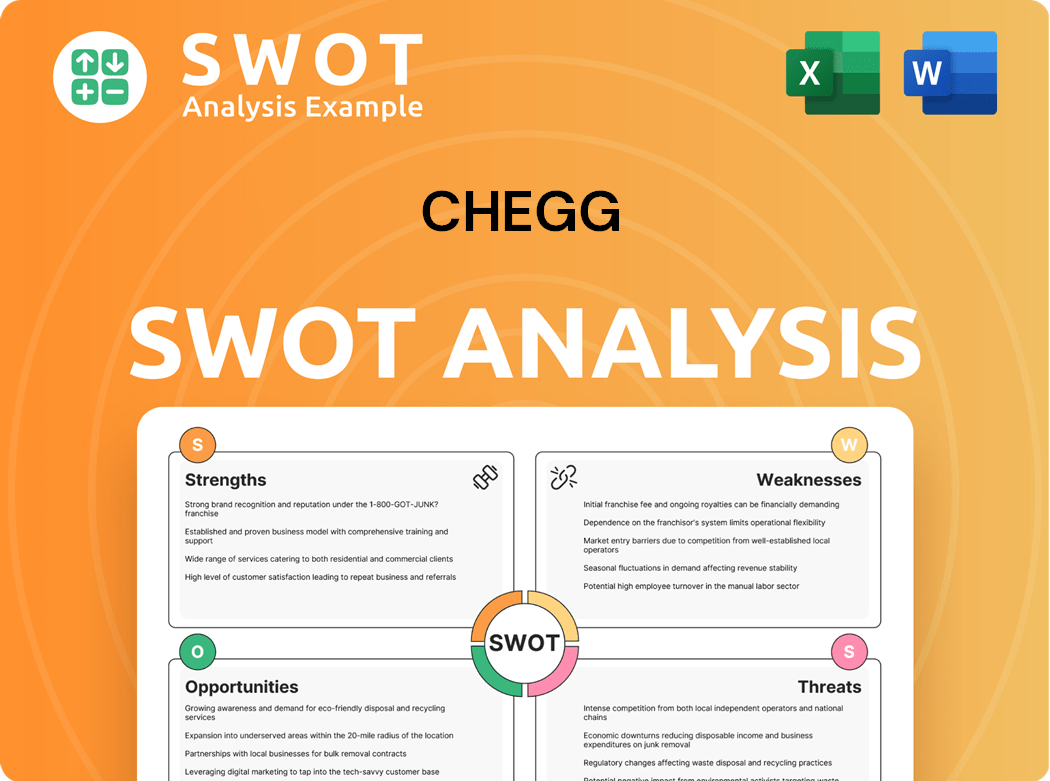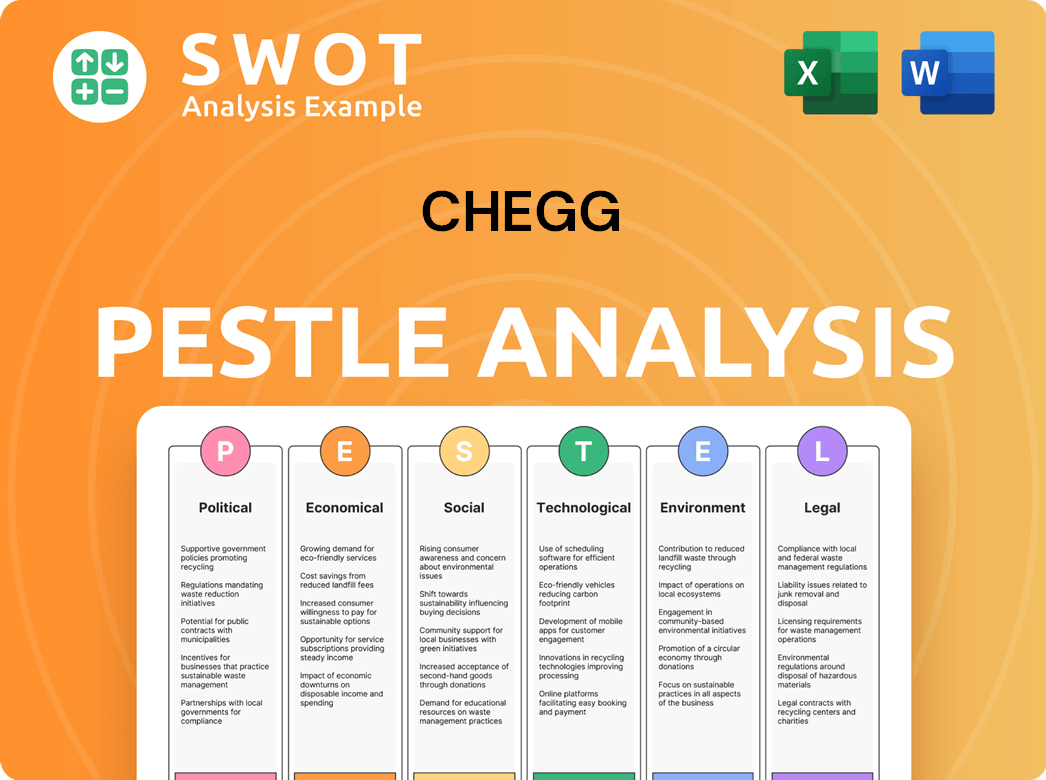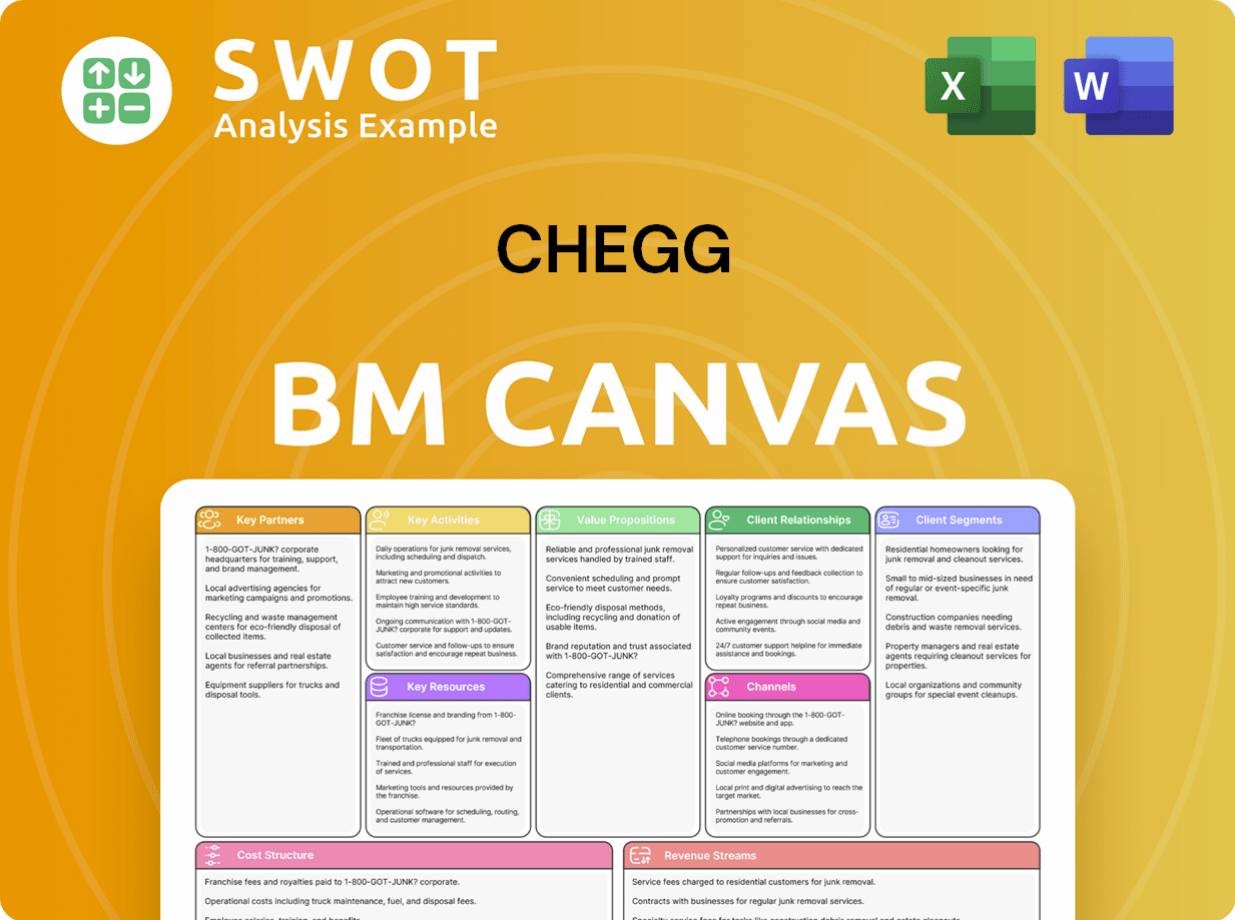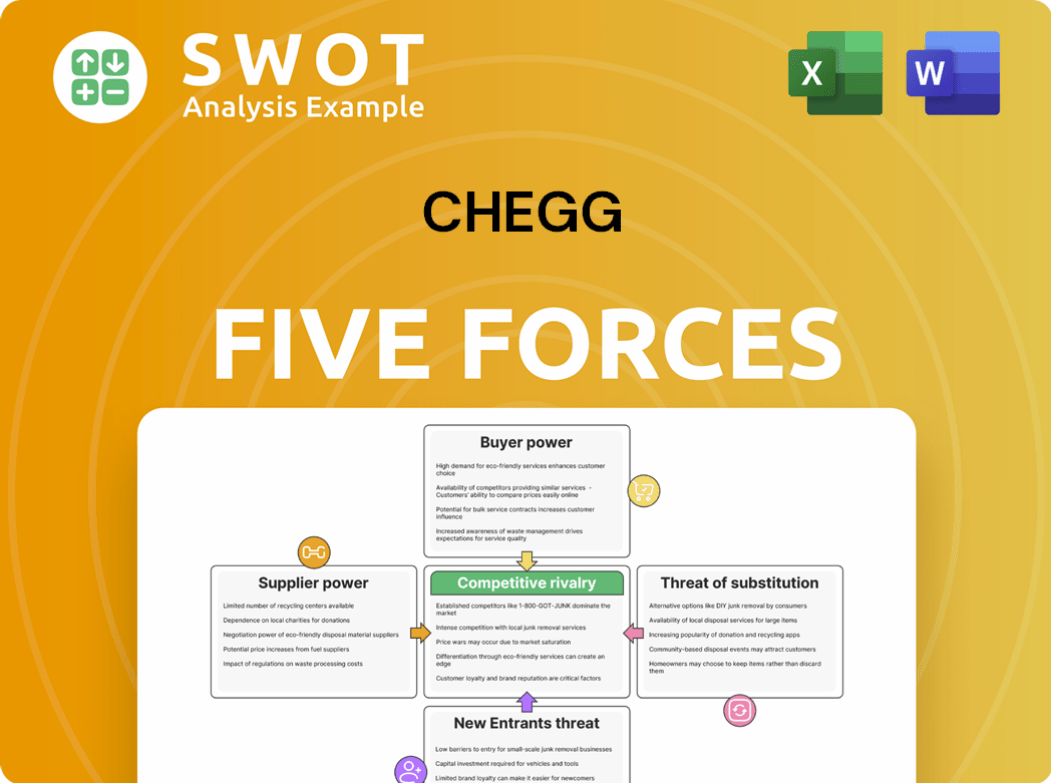Chegg Bundle
How Does Chegg Navigate the EdTech Battlefield?
From its humble beginnings as a textbook rental service, Chegg has evolved into a powerhouse in the online education space. This transformation reflects a keen understanding of student needs and a willingness to adapt to the ever-changing digital landscape. But who are Chegg's main rivals, and how does it maintain its competitive edge?

To truly understand Chegg's position, we must dissect its Chegg SWOT Analysis and explore the Chegg competitive landscape. This analysis will provide a comprehensive Chegg market analysis, identifying key Chegg competitors and evaluating its strategies within the dynamic EdTech industry. Understanding Chegg's business model and its impact on student resources is crucial for anyone interested in the future of online education platforms.
Where Does Chegg’ Stand in the Current Market?
The company is a significant player in the education technology sector, particularly in online academic support and textbook solutions. It offers various services, including Chegg Study, Chegg Writing, Chegg Math Solver, and Chegg Live. Its primary focus is on providing resources for high school and college students. The company's main goal is to assist students with their academic needs through digital platforms.
The company has evolved from a textbook rental service to a comprehensive digital learning platform. This shift allows it to provide a wider range of services and meet diverse student needs. The company's services are primarily available in the United States, but it serves a global student customer base through its online platforms. The company strategically positions itself to offer a variety of resources to students.
Financial performance indicates a strong market presence. For the full year 2023, the company reported total net revenues of $759.5 million. The gross margin was 72%, and the adjusted EBITDA margin was 31%. The company projected full-year 2024 revenue to be between $600 million and $605 million. This financial data demonstrates the company's substantial presence in the market.
The company's core operations revolve around providing online academic support and resources. Key services include Chegg Study for step-by-step solutions, Chegg Writing for grammar checks, Chegg Math Solver, and Chegg Live for tutoring. These services are designed to assist students with their coursework and academic needs. The company's operations are primarily digital, catering to a global student audience.
The company's value proposition lies in offering accessible and affordable academic support. It provides students with resources to improve their understanding of course material. The company aims to make education more accessible and manageable. Its services help students succeed academically.
The company primarily targets college and high school students. Its services are designed to supplement traditional education methods. The company focuses on providing resources that enhance the learning experience. Its customer base is primarily located in the United States.
While the company is based in the United States, its online platforms serve a global student base. The company's services are accessible worldwide. Its digital format allows for broad geographic reach. The company's international expansion plans are designed to grow its customer base.
The company holds a strong position in the online homework help and digital textbook rental markets. It has strategically shifted its focus from textbook rentals to a comprehensive digital learning platform. This transformation allows the company to diversify its offerings and cater to a wider range of student needs. The company's Chegg competitive landscape includes various Chegg competitors in the EdTech industry.
- The company's revenue for 2023 was $759.5 million, with a gross margin of 72%.
- The projected revenue for 2024 is between $600 million and $605 million.
- The company's financial performance indicates a significant presence in the market.
- For more insights into the company's financial health, consider reading about Owners & Shareholders of Chegg.
Chegg SWOT Analysis
- Complete SWOT Breakdown
- Fully Customizable
- Editable in Excel & Word
- Professional Formatting
- Investor-Ready Format

Who Are the Main Competitors Challenging Chegg?
The Growth Strategy of Chegg is significantly influenced by the competitive dynamics within the EdTech industry. Understanding the Chegg competitive landscape is crucial for evaluating its market position and future prospects. This analysis involves identifying key Chegg competitors and assessing their respective strengths and weaknesses.
The Chegg market analysis reveals a complex interplay of direct and indirect competitors, each vying for a share of the student resources market. The competitive environment is constantly evolving, shaped by technological advancements, changing student needs, and the emergence of new educational platforms. This chapter will delve into the major players challenging Chegg and the strategies they employ.
Chegg faces a diverse array of competitors across its various service offerings in the education technology landscape. In the realm of online tutoring and homework help, direct competitors include companies like Course Hero and Brainly. Course Hero, a platform for study resources, often competes with Chegg Study by offering user-generated and expert-verified content, while Brainly focuses on a community-driven Q&A model. Both these platforms challenge Chegg by offering alternative access to academic assistance and study materials.
Course Hero provides study resources, including user-generated content and expert-verified materials. Brainly operates on a community-driven Q&A model, offering students a platform for collaborative learning.
Pearson, a traditional publishing giant, is a significant competitor in the digital textbook and courseware space. Pearson's digital learning solutions directly compete with Chegg's digital textbook rentals and Chegg Study offerings.
Various smaller, specialized ed-tech startups consistently emerge, offering niche services that could chip away at Chegg's market share. These startups often focus on specific areas like writing assistance or math solving.
Companies like Google and Microsoft are integrating AI into their educational tools, potentially offering free or low-cost alternatives. These AI-driven tools pose a competitive threat to some of Chegg's paid services.
Open educational resources (OER) and university-provided online learning tools serve as indirect competitors. These resources offer free alternatives to paid services, impacting Chegg's market.
Many universities provide their own online learning tools, which can serve as indirect competitors. These tools often offer similar services to those provided by Chegg, but at a lower cost or for free.
Several factors influence the competitive landscape. These include pricing models, the breadth and depth of content offered, the quality of tutoring services, and the integration of AI technologies. Understanding these factors is crucial for assessing Chegg's competitive advantages and disadvantages.
- Pricing and Subscription Options: Competitors often offer varied pricing models, including subscription-based access, pay-per-use options, and bundled services.
- Content Quality and Breadth: The range and accuracy of study materials, including textbooks, solutions, and expert-verified content, are critical.
- Tutoring Services: The availability, expertise, and responsiveness of tutors significantly impact the user experience.
- AI Integration: The incorporation of AI-powered tools for personalized learning, automated feedback, and content generation is a growing trend.
Chegg PESTLE Analysis
- Covers All 6 PESTLE Categories
- No Research Needed – Save Hours of Work
- Built by Experts, Trusted by Consultants
- Instant Download, Ready to Use
- 100% Editable, Fully Customizable

What Gives Chegg a Competitive Edge Over Its Rivals?
Understanding the Chegg competitive landscape requires a look at its core strengths. The company has built strong brand recognition, a key advantage in the EdTech industry. Its extensive content library, particularly for Chegg Study, provides a significant barrier to entry for new online education platforms.
Chegg's integrated service offerings, including textbook rentals, tutoring, and writing tools, create a comprehensive ecosystem. This bundling enhances customer loyalty and provides a one-stop-shop experience for students. This strategy has helped the company maintain a competitive edge in the market.
The company’s ability to maintain and develop its proprietary technology and content, along with fostering a strong brand, will be crucial for sustaining these advantages in a rapidly evolving market. This approach allows Chegg to compete effectively against other Chegg competitors.
Chegg benefits from established brand recognition, fostering trust within its target demographic. This trust is crucial in the education sector. The brand's reputation helps attract and retain users.
A vast content library, including millions of step-by-step solutions, is a significant competitive advantage. This library provides a rich resource for students seeking academic assistance. The content is continuously updated and expanded.
Chegg integrates various academic support services under one platform. This bundling of services enhances customer loyalty. It provides a one-stop-shop experience for students, making it more appealing.
The company's ability to maintain and further develop its proprietary technology and content is crucial. This includes adapting to advancements like AI. This helps sustain its advantages in a rapidly evolving market.
Chegg's competitive advantages are rooted in its brand, content, and integrated services. These elements create a strong position within the Chegg market analysis. The company's ability to adapt to technological changes is also crucial.
- Brand Recognition: Established trust and familiarity among students.
- Content Library: Extensive resources, including step-by-step solutions.
- Integrated Services: Comprehensive platform for academic support.
- Technological Adaptation: Ability to evolve with market changes and AI.
Chegg Business Model Canvas
- Complete 9-Block Business Model Canvas
- Effortlessly Communicate Your Business Strategy
- Investor-Ready BMC Format
- 100% Editable and Customizable
- Clear and Structured Layout

What Industry Trends Are Reshaping Chegg’s Competitive Landscape?
The education technology (EdTech) sector is currently experiencing significant shifts, particularly due to advancements in artificial intelligence (AI) and evolving student preferences. These trends present both challenges and opportunities for companies like Chegg. Understanding the Chegg competitive landscape requires an analysis of these shifts, including how the company adapts to new technologies and market demands. The Chegg market analysis must consider the impact of these trends on its business model and future growth prospects.
The primary risks involve the rise of AI-powered tools that offer free or low-cost alternatives to Chegg's services, potentially impacting its subscriber base. Moreover, changes in regulations regarding data privacy and the increasing availability of free educational resources could intensify competitive pressures. However, the future outlook remains promising due to the expanding global demand for online education and supplemental learning resources. Chegg's ability to innovate, effectively integrate AI, and adapt to student needs will be critical to its long-term success. For more information, you can check out the Target Market of Chegg.
The EdTech industry is witnessing rapid AI integration, with tools like ChatGPT impacting homework help services. Personalized learning experiences are becoming more critical, and students are increasingly favoring flexible and accessible digital resources. These trends shape the Chegg competitive landscape and influence its strategic direction.
A key challenge is the rise of generative AI, which may offer free alternatives to Chegg's services. Regulatory changes regarding data privacy and the increasing availability of free educational resources also pose risks. Adapting to these challenges will be crucial for Chegg's continued success. The company needs to navigate these challenges to maintain its market position.
The growing global demand for online education and supplemental learning resources presents significant opportunities. Chegg can expand its AI-powered tools, broaden its international reach, and form strategic partnerships. Diversifying into skills-based learning and career development can also attract a wider audience.
To remain competitive, Chegg must innovate quickly, integrate AI effectively, and adapt to changing student needs. The company can leverage its existing resources to offer more comprehensive services. Strategic adaptations are key to maintaining and improving its market position.
Chegg's ability to adapt to these trends will determine its success. The company must focus on integrating AI, expanding its service offerings, and forming strategic partnerships. These strategies are essential for navigating the Chegg competitive landscape effectively.
- AI Integration: Develop and enhance AI-powered study tools.
- Service Diversification: Expand offerings to include skills-based learning and career development.
- Global Expansion: Increase international reach and partnerships with educational institutions.
- Strategic Partnerships: Form alliances to enhance service offerings.
Chegg Porter's Five Forces Analysis
- Covers All 5 Competitive Forces in Detail
- Structured for Consultants, Students, and Founders
- 100% Editable in Microsoft Word & Excel
- Instant Digital Download – Use Immediately
- Compatible with Mac & PC – Fully Unlocked

Related Blogs
- What are Mission Vision & Core Values of Chegg Company?
- What is Growth Strategy and Future Prospects of Chegg Company?
- How Does Chegg Company Work?
- What is Sales and Marketing Strategy of Chegg Company?
- What is Brief History of Chegg Company?
- Who Owns Chegg Company?
- What is Customer Demographics and Target Market of Chegg Company?
Disclaimer
All information, articles, and product details provided on this website are for general informational and educational purposes only. We do not claim any ownership over, nor do we intend to infringe upon, any trademarks, copyrights, logos, brand names, or other intellectual property mentioned or depicted on this site. Such intellectual property remains the property of its respective owners, and any references here are made solely for identification or informational purposes, without implying any affiliation, endorsement, or partnership.
We make no representations or warranties, express or implied, regarding the accuracy, completeness, or suitability of any content or products presented. Nothing on this website should be construed as legal, tax, investment, financial, medical, or other professional advice. In addition, no part of this site—including articles or product references—constitutes a solicitation, recommendation, endorsement, advertisement, or offer to buy or sell any securities, franchises, or other financial instruments, particularly in jurisdictions where such activity would be unlawful.
All content is of a general nature and may not address the specific circumstances of any individual or entity. It is not a substitute for professional advice or services. Any actions you take based on the information provided here are strictly at your own risk. You accept full responsibility for any decisions or outcomes arising from your use of this website and agree to release us from any liability in connection with your use of, or reliance upon, the content or products found herein.